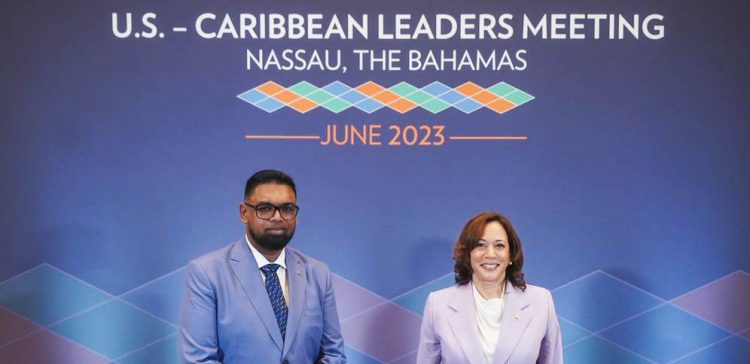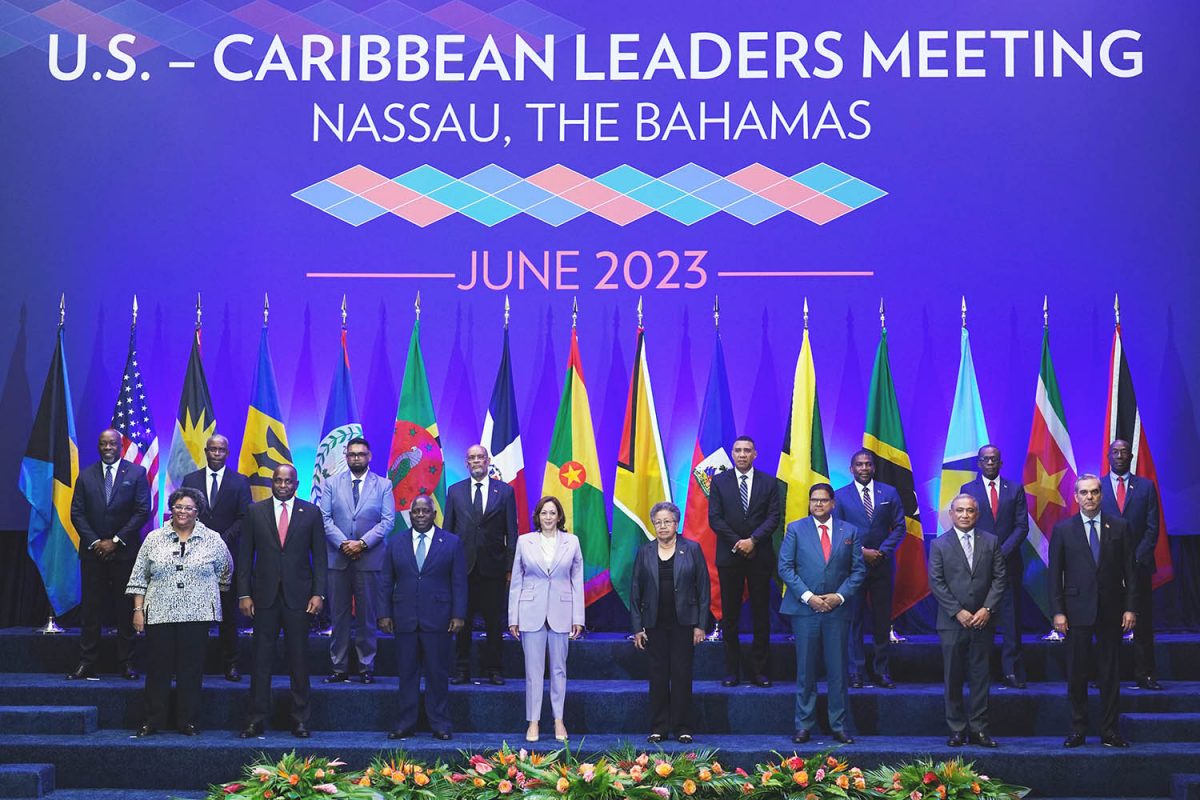At a meeting with Carib-bean leaders in The Bahamas, US Vice President Kamala Harris yesterday unveiled humanitarian aid for Haiti, financing for clean energy and emergency response and a new post in the Department of Justice to interrupt arms trafficking to the region.
In a transcript of her remarks to the leaders released by her office, Harris said strengthening the U.S.-Caribbean relationship is a priority for her, as it is for President Joe Biden.
Yesterday’s meeting at Paradise Island – with President Irfaan Ali in attendance – was the fourth multilateral meeting Harris said she had hosted with Caribbean leaders.

Regarding the existential threat of the climate crisis, Harris said that Caribbean nations are on the front lines and “We have discussed, for example, powerful storms that can wipe out economic progress; low-lying islands that face erosion, flooding, and deadly storm surge from rising seas”.
She said that these discussions resulted in the launch of the U.S.-Caribbean Partnership to Address the Climate Crisis —PACC 2030 — last year at the Summit of the Americas in Los Angeles.
Since the Los Angeles meeting, she said that the United States has helped to facilitate clean energy projects throughout the region.
“I’ll offer some examples: in St. Lucia, the work that we have done thus far to deploy solar microgrids to power schools, hospitals, and water treatment plants; Dominica and St. Kitts, to develop commercial geothermal power projects; Antigua and Bar-buda, to train a clean energy workforce; and the Dominican Republic, to integrate battery storage in their energy grid.
“Our work together has also helped build capacity for disaster preparedness. For example, the administrator of (National Oceanic and Atmospheric Adminis-tration) led a group of U.S. export — experts to Barbados to support regional resilience, including early warning systems and sharing climate information with communities.
“We established a network of Caribbean-based scientific experts to create new climate mitigation and adaptation methods”, she stated.
Harris added that the two sides have also worked to bring investors to the Caribbean to identify new opportunities for clean energy infrastructure, including through trade missions.
“We have provided (US)$28 million in food security assistance. And we have invested in the Blue-Green Investment Corporation, spearheaded by Barbados, which we expect to unlock up to (US)$210 million over three years”, she said.
Harris then announced additional PACC 2030 investments.
“One, specifically, a (US)$20 million investment in the Caribbean Climate Investment Pro-gram to help incentivize the private sector to partner with Caribbean nations to develop more clean energy technologies, like microgrids and energy storage systems, and to help businesses become more energy efficient in their operations.
“And, second, a (US)$15 million investment to support emergency response efforts and strengthen the capacity of the Caribbean Disaster Emergency Management Agency. This investment is intended to help develop new early warning systems and pre-position first aid equipment and generators”, she disclosed.
She said that another key area of the US work with the Caribbean, through PACC 2030, is to increase access to development financing. To that end, earlier this week, she said that she met with the new President of the World Bank, Ajay Banga, and informed him that the United States will lead a diplomatic campaign on multilateral development bank reform.
“My conversations with the leaders at this table helped inform our administration’s approach. We seek more available and — availability of low-cost concessional financing to nations in the Caribbean. And we believe addressing the climate crisis should be a critical part of the mission of the World Bank.
“More broadly, new debt must include disaster clauses to allow a pause on debt payments immediately following a natural disaster.
“And, three, we want the bank to better mobilize the private sector in support of these goals”, she added.
On the issue of security, she said that too many people are dying from gun violence.
“I will reiterate that our administration is committed to disrupt gun trafficking. We are committed to interdict shipments of arms and ammunition and hold traffickers accountable.
“And today, I am pleased to announce that the United States Department of Justice will create a new position, a Coordinator for Caribbean Firearms Prosecutions, which will help maximize information sharing between our countries to support the prosecution of traffickers.
“This effort will be aided by the bipartisan Safer Communities Act, which President Biden signed last year, and includes new federal criminal offenses for firearms trafficking and straw purchases”, she stated.
In addition, through the U.S. law enforcement agencies, the U.S. supporting a recently established Caribbean Crime Gun Intelligence Unit in Trinidad and Tobago to train officials in firearms investigations and help bring criminals to justice.
“And we will stand up a Haiti Transnational Criminal Investigative Unit in collaboration with the Haitian National Police to facilitate investigation and prosecution of firearms and human trafficking, which affects the entire region”, Harris stated.
More broadly on the issue of Haiti she said that the United States supports the development of a multinational force to Haiti.
“And today I’m pleased to announce $53.7 million in new humanitarian aid for Haiti. In addition, our administration will support the extension of HOPE-HELP trade preferences for Haiti, which are due for renewal in 2025”, she said.
She also announced that the Biden-Harris administration has begun the process to establish an expanded diplomatic presence in the Eastern Caribbean, including two new embassies.
Productive
Meanwhile, in a statement last night, CARICOM Heads of Government welcomed the meeting and called for a lifting of US sanctions against Venezuela.
They noted that the meeting with Harris presented a useful platform for productive discussions.
“Leaders noted the progress of the work of the High-Level Committee on Food Security between the USA, CARICOM and the Dominican Republic resulting from the Summit of the Americas process. They reaffirmed that the matter of food security must continue to be given priority as part of the enhanced Caribbean-US engagement. They emphasized that, to this end, commitments already made must be implemented, and that the two sides should examine additional ways to address this challenge, which affects the Region and the global community”, the statement said.
The Leaders also welcomed the announcement of increased resources to respond to trafficking of firearms and gun crimes.
“However, they underscored their grave concern at the continued increase in the illegal exportation of guns from the United States of America, which contributes significantly to crime and violence in the Region, causing death and disabilities, and compromising safety and democracy.
“They called on the United States to support efforts to manage porous borders and share intelligence to combat the increasing destabilization due to firearm proliferation and related crimes in the Region”, the statement said.
With respect to the situation in Haiti, the statement said that the leaders underscored that social and economic development is critical to the country’s future stability. They outlined ongoing CARICOM Good Offices Initiatives, including appointment of an Eminent Persons Group to broker discussions with Haitian stakeholders scheduled to formally start with meetings in Jamaica from 11-13 June 2023.
The Caribbean leaders also stressed the importance of reform of the global financial system to mobilise short-term liquidity for crisis response and long-term funding for sustainable development, as proposed under the Bridgetown Initiative. They recognised the progress made to include Climate Disaster Clauses and noted that support is needed to finance Global Public Goods that address mitigating their vulnerability.
Leaders also recognised that to address the challenge of energy security, there must be a balanced approach to develop the region’s hydrocarbon resources – a position of President Ali – and to maximize renewable energy potential. They agreed that the Caribbean-US engagement must continue to explore areas for deepened collaboration where opportunities exist.
In the context of the bilateral relationship with the United States, CARICOM Heads of Government urged for the removal of sanctions on Venezuela to allow countries in the Region to benefit from the PetroCaribe initiative and for progress on the exploitation of cross-border natural gas fields between Trinidad and Tobago and Venezuela. The leaders also emphasised CARICOM’s consistent call for the removal of sanctions against Cuba.




